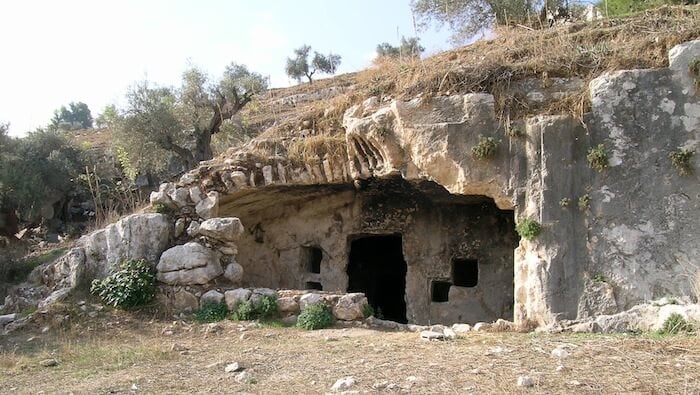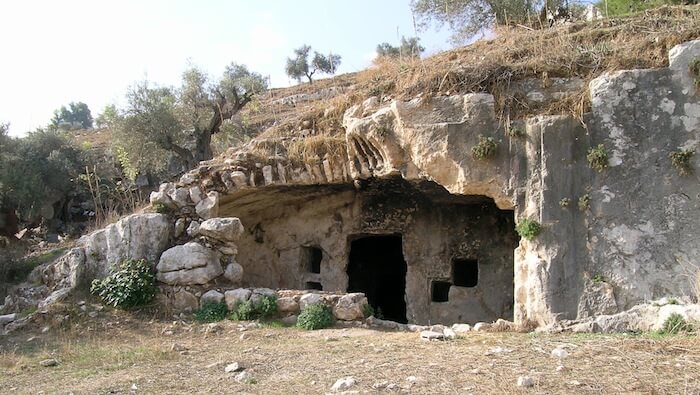
Summer in Texas always makes me think of hell. That’s probably because each summer when I was a boy my stepdad would squint at the sky, wipe the sweat from his brow, and offer his summer benediction:
Spring has sprung, fall has fell, summer is here, and it’s hotter than . . . usual.
Funny, but we always try to leave that last part out, don’t we?

(Photo: Hinnom Valley tomb, Jesus used the gorge as a metaphor for hell. Courtesy of the Pictorial Library of Bible Lands)
Hell brightens a conversation about as much as a root canal. Nobody wants to talk about it. But the dentist does you no favors by keeping the truth from you. You need to know the facts about the malady and the options for dealing with it.
You know who spoke about hell more than anyone else in the Bible?
Jesus.
The Buffet of Truth
When we go through a food buffet, we enjoy the indulgence of choosing as many chicken wings as we please and leaving the green bean casserole for the next guy in line. (At least I do.)
We often approach God the same way. We load up our plates with the parts of Scripture that speak of God’s love, mercy, and grace. But God’s justice and wrath? Uh, we leave that for the next guy in line. But we can’t cherry-pick the attributes of God we want to believe. If we do, we fashion a god in our own image and likeness. But it’s not the God of the Bible—the real God.
The Scriptures serve us on the same plate two truths about the Lord:
[God] keeps lovingkindness for thousands, who forgives iniquity, transgression and sin; yet He will by no means leave the guilty unpunished. —Exodus 34:7
With no contradiction or apology, God reveals Himself as both loving and just. And part of His justice involves recompense for those who did not respond to His revelation. (That includes hell.)
Is Hell Really Necessary?
But is hell really necessary? I mean, how can we harmonize the existence of a God of infinite love allowing a place of eternal torment? Such a seeming contradiction tends to leave a thin, putrid film in our mouths—as if we just ate green bean casserole.
Why not just annihilate the unbeliever’s soul in an act of mercy? For one simple reason: you cannot annihilate something eternal.
- God created humanity in His eternal image (Genesis 1:27).
- God saw the real possibility of people who sinned living forever in a fallen state (Genesis 3:22).
- God thought it better to redeem humanity through Christ, allow people to die, and then resurrect them in perfection for eternal life.
Jesus spoke of hell more than anyone else did, often referring to Jerusalem’s Hinnom Valley as a metaphor of hell. Jesus revealed that both heaven and hell are real, eternal places. We can’t have one without the other: “And these will go away into eternal punishment, but the righteous into eternal life” (Matthew 25:46).

(Photo: Jerusalem’s Hinnom Valley. Courtesy of the Pictorial Library of Bible Lands)
Hell is a Decision, Not Just a Destination
C. S. Lewis once remarked there are two kinds of people in the world: those who say to God, “Thy will be done,” and those to whom God will say, “Thy will be done.”
If God sends someone to hell, that person chose the destination every day he or she refused to respond to God who has revealed Himself to us in three ways:
- In His creation (Romans 1:18-25)
- In our consciences (Romans 2:14-16)
- In Scripture (Romans 2:17-29)
Even the atheist, Jean-Paul Sartre, in his play, “No Exit,” wrote: “The gates of hell are locked from the inside by man’s free choice.” Whatever he meant by that, it remains true.
Remember that the same God who will send a person to hell also sent His Son Jesus to the cross to provide salvation.
Between us and heaven or hell there is only life, which is the frailest thing in the world. —Blaise Pascal
Is hell really necessary? Yes, but not necessarily for you—or for anyone willing to believe in Jesus Christ.
Tell me what you think: What do you think about hell? To leave a comment, just click here.
Click here to leave a comment.
-1.png?width=5230&height=1198&name=unnamed%20(4)-1.png)

.jpg?width=350&name=Wayne-books-350wide%20(1).jpg)




